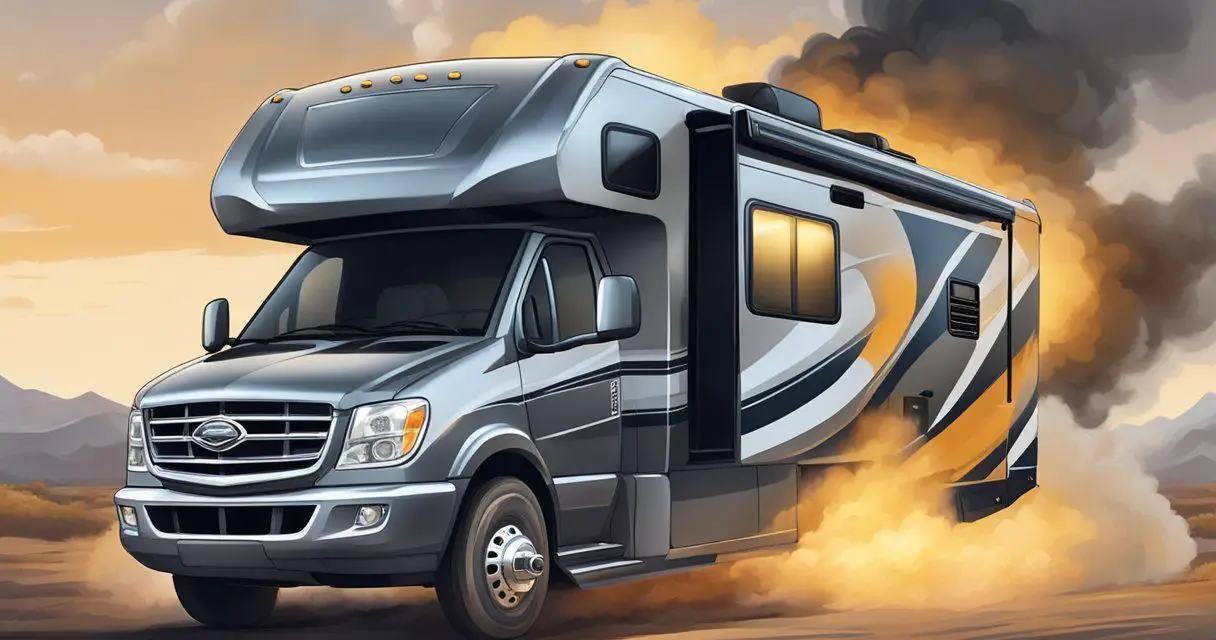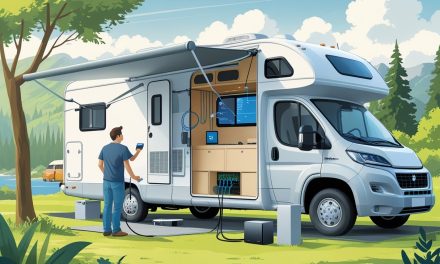Would you like to save this article?
RV adventures offer unparalleled freedom and excitement on the open road. To fully enjoy these experiences, it’s crucial to keep your motorhome’s engine in top shape. A well-maintained RV engine ensures smooth travels and helps avoid unexpected breakdowns that could put a damper on your journey.
When we asked in our newseltter, “Which RV maintenance task do you find most challenging?”, 33% of you said it was engine maintenance.
Regular maintenance of your RV’s engine can significantly extend its lifespan and improve overall performance. By following a few key tips, RV owners can keep their vehicles running efficiently for years to come. Proper care not only saves money on costly repairs but also provides peace of mind during long trips. Let’s explore some essential practices for maintaining your RV’s engine and keeping your home-on-wheels ready for the next adventure.
1) Regular oil changes
Regular oil changes are crucial for keeping an RV engine in top shape. Fresh oil keeps your engine running smoothly and prevents excessive wear on its components.
Most RV manufacturers recommend changing the oil every 3,000 to 5,000 miles or every six months, whichever comes first. RV owners should always consult their vehicle’s manual for specific guidelines.
Oil changes help remove contaminants and debris that accumulate over time. This process ensures proper lubrication of engine parts, reducing friction and preventing overheating.
When changing the oil, it’s important to use the correct type and viscosity as specified by the manufacturer. Using the wrong oil can lead to decreased performance and potential engine damage.
RV owners should also replace the oil filter during each oil change. This helps maintain clean oil circulation throughout the engine, extending its lifespan and improving overall performance.
By sticking to a regular oil change schedule, RV enthusiasts can enjoy smoother rides and avoid costly engine repairs down the road.
2) Check coolant levels
Maintaining proper coolant levels is crucial for RV engine health. Regular checks help prevent overheating and potential damage during long trips.
RV owners should inspect coolant levels frequently, especially before embarking on journeys. The coolant reservoir and radiator should be examined for any signs of leaks or low fluid.
It’s important to keep coolant within the recommended range. This ensures optimal temperature regulation, particularly in varying climates and during extended drives.
Seasonal changes can affect coolant performance, making regular checks even more important. RV enthusiasts should pay extra attention during hot weather or when planning trips to warmer regions.
If coolant levels are consistently low, it may indicate a leak in the system. Prompt identification and repair of leaks can prevent more serious engine issues down the road.
RV owners should familiarize themselves with their vehicle’s specific coolant requirements. Using the correct type and mixture of coolant is essential for maintaining engine efficiency and longevity.
3) Replace air filters
Keeping your RV’s air filter clean is crucial for maintaining engine performance. A dirty air filter can reduce fuel efficiency and potentially damage the engine.
Regular replacement of air filters prevents dust, debris, and other contaminants from entering the engine. This ensures optimal combustion and protects the engine’s internal components.
RV owners should check their owner’s manual for the recommended replacement schedule. Typically, air filters need changing every 12,000 to 15,000 miles or every 2 years, whichever comes first.
Those who frequently travel in dusty conditions may need to replace their air filters more often. It’s a good idea to visually inspect the filter every few months or before long trips.
Replacing an air filter is usually a simple DIY task. Most RV air filters are easily accessible and can be swapped out with basic tools. If unsure, it’s best to consult a professional mechanic.
Clean air filters contribute to better engine performance, improved fuel economy, and reduced emissions. It’s a small maintenance task that can have a big impact on an RV’s longevity and performance.
4) Inspect spark plugs
Spark plugs play a crucial role in your RV’s engine performance. Regular inspection can help prevent misfires and ensure optimal fuel efficiency.
Check spark plugs every 30,000 miles or as recommended by the manufacturer. Remove them carefully using a spark plug socket and inspect for signs of wear or damage.
Look for carbon deposits, oil fouling, or electrode damage. A healthy spark plug should have a light tan color on the electrode.
If the spark plugs appear worn or damaged, it’s time for replacement. Clean or replace them according to the manufacturer’s guidelines to maintain engine performance.
Properly functioning spark plugs contribute to smooth engine operation and fuel efficiency. They also help prevent starting issues and ensure reliable performance during your RV adventures.
Remember to use the correct spark plug type for your RV’s engine. Consult the owner’s manual or a professional if unsure about the right replacement.
5) Test battery health
Regular battery testing is crucial for RV owners. A healthy battery ensures your RV’s electrical systems function properly during trips.
Load testing is an effective way to check battery health. This method simulates real-world usage conditions and evaluates the battery’s capacity.
To perform a basic test, use a multimeter to measure voltage. A fully charged 12-volt battery should read around 12.6 volts. Lower readings may indicate a problem.
Keep an eye out for signs of a failing battery. Slow engine cranking or difficulty starting the RV can be red flags.
RV owners should check their batteries at least every 90 days, especially during storage periods. This helps prevent issues like lead sulfate buildup, which can shorten battery life.
Consider using a maintenance charger for stored RVs. It keeps the battery charged without risking overcharging, extending its lifespan.
By regularly testing and maintaining the RV battery, owners can avoid unexpected power issues and enjoy worry-free travels.






